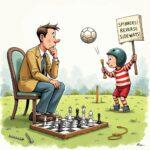
The seed is planted—now we watch humanity choose its timeline. The last several years have served as a prelude, a global dress rehearsal for a moment of decision that is far more definitive than any public health mandate. If the “pandemic” was the initial test of our cognitive liberty and our willingness to submit to the “official lie,” then the unveiling of the Jeffrey Epstein scandal and the release of […] Read more »













